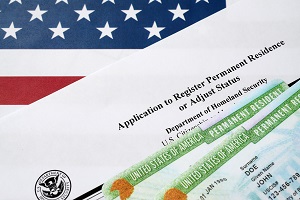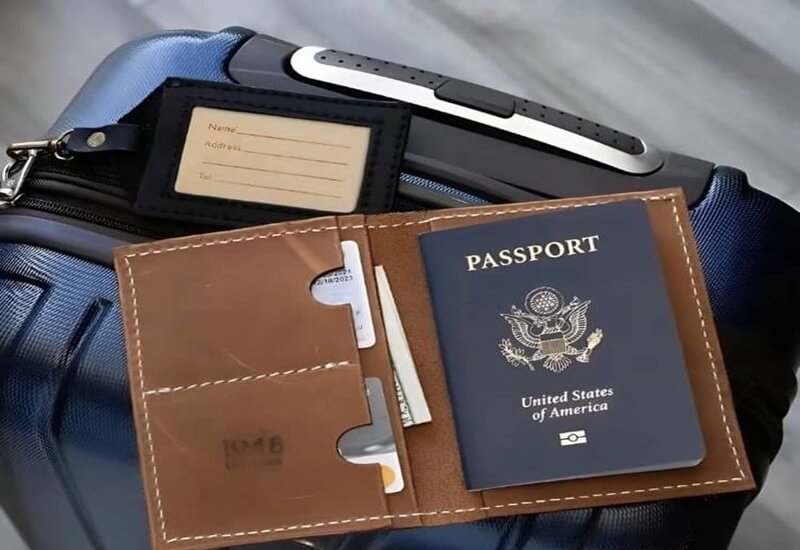What Is The Conditional Green Card About?
What Is A Conditional Green Card?
A Conditional Green Card provides a two-year residency to a person married to a U.S Citizen. During these two years, the couple must build a record to prove a good faith marriage.
According to USCIS, a small percentage of marriage-based Green Card applications are fraudulent. Less than one percent of these applications are declined for fraud.
At the end of the two years, the couple must file a Petition to Remove Conditions on Residence, known as Form I-751. It’s important to note that while a Green Card can be renewed every 10 years, a Conditional Green Card cannot be renewed.
Other than that, and in most cases, a Conditional Resident has the same rights as a Green Card holder.

Why Do People Get Conditions On Their Green Card?
If you end up with a conditional Green Card, this doesn’t mean that USCIS thinks that your marriage seems shady or suspicious, they should give it to everybody married for less than two years at the time that we apply for the residency.
In case you haven’t been married for very long, you’re gonna get a conditional Green Card.
If it’s been two years and a day, then you’ll get the 10-year Green Card, so it’s based on how long the couple’s been married.
If I Just Got Married Should I Wait To Apply For My Green Card?
In case you’ve been married already for a year and three-quarters of almost two years, maybe it is worth waiting a couple of months so that you get the tenure Green Card because you don’t have to go through the removal of conditions process.
We could always get started on the case, and then, maybe wait to submit until after we’ve hit the two-year mark.
If you’ve just gotten married, we think it makes more sense to go ahead and get the process started.
The sooner you get conditional residency, the sooner that you’re able to apply for naturalization too.
It’s nice because your time as a conditional resident counts towards your naturalization time.
Difference Between Renewing Opposed To Removing These Conditions?
Normally, at Lincoln-Goldfinch Law – Abogados de Inmigración we see a lot of people come in and say: I’ve applied for the I-90 to renew my Green Card and it’s been pending for a long time. Can you guys help me figure out what happened?
It turns out they were a Conditional Resident and what they should have applied for is to remove the conditions on their Green Card with the I-751, it’s a different application.
USCIS won’t approve an I-90 for you because that’s not what you need to do, what you need to do is show that you’re still married to the petitioner.
You’ll need to submit again, it’s like when you first apply for your residency, and you have to submit all this paperwork to show that you’re in a real relationship and that you got married to build a life together.
What you need to show with the removal of conditions, is that that has continued for the last two years.
You’ve remained living together, you’ve remained married, and showed some updated good faith marriage evidence.
Then, they’ll take away those conditions and issue you a 10-year Green Card at that point.

What Kind Of Evidence Can You Submit To Prove Good Faith Marriage?
It can be things like taxes that they file together if your driver’s licenses have the same address if you’re on the lease together if you share bank accounts or credit cards.
If you have changed jobs and you have new benefits, your spouse is one of the beneficiaries.
How Soon Should I Start My Process Before My Conditional Green Card Expires?
You can’t submit the application to remove the conditions until you’re within the 90-day window before your Green Card expires, so it can’t be 91 days before, it’s got to be in those 90 days.
We suggest you go ahead and do it on those 90 days because it does take a while.
Right now, we’re seeing these applications pending for more than a year and a half.
A lot of times folks will apply to remove their conditions, and before they receive that decision, they’re already eligible to naturalize, or they’ve already naturalized, they’ve become citizens while they were waiting for that petition to be approved.
Some people are married to legal permanent residents, and that’s different, you have to wait five years but if you’re married to a U.S citizen you wait three years.
If you’ve been a conditional resident for two years, and your application’s been pending for a year and a half, you’ve already hit that three-year mark while you’re waiting on that application to be decided.
In that case, you can go ahead and apply for naturalization at that point
What Happens If Your Green Card Expires While Waiting?
Right now they’re issuing you the receipt for your I-751, they extend your Green Card for either 18 months or two years.
It kind of depends on how long they’re taking to process those applications right now.
From the date that your Green Card expires, you’ve got an additional 24 months.
If you need to travel or you need to show work, you would show work with your conditional permanent resident card, plus your receipt notice for the I-751 that extends its validity.
What Happens If The Removal Of Condition Gets Denied?
One of the consequences of not filing the removal conditions or being denied is that it could get referred to immigration court.
If for some reason USCIS believes that it’s not a real marriage those two years you were just getting married for the Green Card, and you haven’t been living together, then, they will put you in process and you’ll have to go in front of a judge and fight your case at that point.
What Happens If You Divorce Your Spouse Before The Conditional Green Card Expires?
There are waivers for the joint filing requirement and the removal of conditions.
Normally, if you’re still married to your spouse, you both end up signing the removal of conditions, and the petitioner signs saying: Yes, we’re still living together, everything here is right. And you as a beneficiary sign saying the same.
If you separate or divorce, we need the full divorce.
There is a divorce waiver that you can file where we show when you entered into the marriage it was a real valid marriage, you did intend to build our life together but things didn’t work out.
You would submit the divorce to create a show and some evidence that shows that it was you who lived together for some time in there and that’s okay.
Is There A Way To Remove Conditions In Your Green Card?
There are a couple of other waivers that we can use depending on the situation of the immigrant in the United States.
There’s an abuse or cruelty waiver, for example, if you’re in an abusive relationship, nobody wants you to stay there, just you to be able to file your removal of conditions after you get yourself out and safe, and there’s a waiver for that.
We just show the abuse with an affidavit, a letter from you saying what happened.
Then, there’s also another waiver for the death of the petitioner, if something happens in those two years, and they pass away, the death certificate can be shown, and then, we can get a waiver in that way, so that you don’t have to have both signatures on the document.
Another thing is that we can file the waivers at any time, so, if you divorce within the first year, we can go ahead and file to remove the conditions with the divorce rate, or if your petitioner passes away or there’s abuse, just reach out to Lincoln-Goldfinch Law – Abogados de Inmigración.

Can Children Also Get Conditional Green Cards?
They do, they get conditional Green Cards and it’s dependent on their parent’s relationship, if they’re staying together or if not, there’s the divorce waiver.
They don’t have to file or present their evidence but they file along with their parents who have the conditional Green Card.
Then, once that one’s approved everyone gets approved for the tenure.
What’s The Difference Between Conditional Green Card & Regular Green Card?
The only real difference is those two years versus ten-year issuance, but for all other purposes, for work purposes, for health insurance purposes, and for everything else, you’re a resident.
It’s just one extra step we have to do to get your 10-year Green Card after those two years expire.
The easiest part is that we don’t have to show as much evidence to the Government to put you into proceedings, to have to try to remove you from the country as if you were a permanent resident.
Once we get their permanent residency we have to show that this person has done something since then, criminal or something like that, to be able to take away their residency and deport them.
In this case when you’re a conditional Green Card holder, if you just never apply to remove those conditions, that’s enough, or if the removal of conditions is denied, that’s enough to get you in the process and be deported.
What Happens If You Commit A Crime While Having A Conditional Green Card?
It can certainly affect your case, and you should ask an attorney to review your court records so that we can make sure that whatever happened or you pleaded to, wasn’t something that can make you removable or inadmissible to the country.
Anytime you’re charged with any kind of crime, reach out to an attorney.
Everyone starting this process needs to make sure that whatever they sign or whatever court paperwork doesn’t negatively impact their immigration status.
Does A DWI Affect Your Conditional Green Card Process?
It shouldn’t, there’s a chance that if it was, for example, the third DWI and it’s a felony, or if someone got hurt, or things like that, aggravating situations.
If it’s a first-time DWI or a second, it should be okay, but this is very general, and it all changes depending on the circumstance.
We encourage people who might be in this situation to go ahead and get an attorney to review their specific circumstances and your specific plea agreement and to make sure that you won’t have any type of issues.
In case you have additional questions about your conditional Green Card, or your specific case, you can contact us at (855) 502-0555. After a short 10-minute evaluation of your case over the phone, we will let you know what options you have. You can also follow us on our social networks so as not to miss our weekly transmissions via Facebook, YouTube & Twitch.
Frequently Asked Questions About Conditional Green Card
Contact A U.S. Immigration Attorney Today!
Categories
How To Find Us
What Our Clients Say
“This Lawfirm is great, very professional and helpful. I love that they are always in communication and always available for when you have questions . 100% recommended by me and my family. Thank you Lincoln-Goldfinch Law – Abogados de Inmigración”





